Filter by
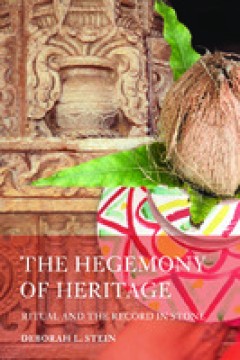
The hegemony of heritage : ritual and the record in stone
The Hegemony of Heritage makes an original and significant contribution to our understanding of how the relationship of architectural objects and societies to the built environment changes over time. Studying two surviving medieval monuments in southern Rajasthan—the Ambikā Temple in Jagat and the Śri Ékliṅgjī Temple Complex in Kailāshpurī—the author looks beyond their divergent sec…
- Edition
- -
- ISBN/ISSN
- 9780520968882
- Collation
- 338 p.
- Series Title
- South Asia Across the Disciplines
- Call Number
- 720.954 STE h
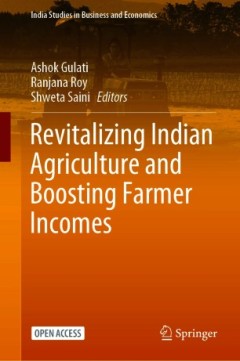
Revitalizing Indian agriculture and boosting farmer incomes
This open access book provides an evidence-based roadmap for revitalising Indian agriculture while ensuring that the growth process is efficient, inclusive, and sustainable, and results in sustained growth of farmers’ incomes. The book, instead of looking for global best practices and evaluating them to assess the possibility of replicating these domestically, looks inward at the best practic…
- Edition
- -
- ISBN/ISSN
- 9789811593352
- Collation
- xxii, 372p. : ill.
- Series Title
- -
- Call Number
- 338.10954 REV r
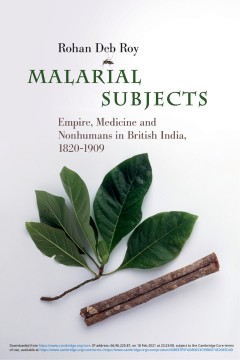
Malarial subjects : empire, medicine and nonhumans in British India, 1820-1909
Malaria was considered one of the most widespread disease-causing entities in the nineteenth century. It was associated with a variety of frailties far beyond fevers, ranging from idiocy to impotence. And yet, it was not a self-contained category. The reconsolidation of malaria as a diagnostic category during this period happened within a wider context in which cinchona plants and their most va…
- Edition
- -
- ISBN/ISSN
- 9781316771617
- Collation
- xv, 332p. : ill.
- Series Title
- -
- Call Number
- 616.936200954 ROY m
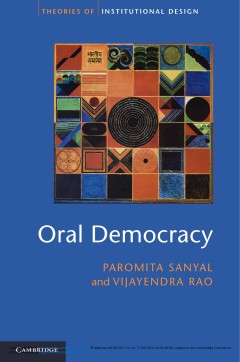
Oral democracy : deliberation in Indian village assemblies
Oral Democracy studies citizens' voices in civic and political deliberations in India's gram sabhas (village assemblies), the largest deliberative institution in human history. It analyses nearly three hundred transcripts of gram sabhas, sampled within the framework of a natural experiment, allowing the authors to study how state policy affects the quality of discourse, citizens' discursive per…
- Edition
- -
- ISBN/ISSN
- 9781139095716
- Collation
- xi, 215p. : ill.
- Series Title
- -
- Call Number
- 320.840954 SAN o
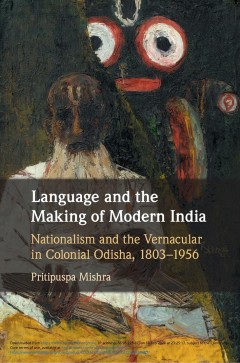
Language and the making of modern India : nationalism and the vernacular in c…
Through an examination of the creation of the first linguistically organized province in India, Odisha, Pritipuspa Mishra explores the ways regional languages came to serve as the most acceptable registers of difference in post-colonial India. She argues that rather than disrupting the rise and spread of All-India nationalism, regional linguistic nationalism enabled and deepened the reach of na…
- Edition
- -
- ISBN/ISSN
- 9781108591263
- Collation
- x, 247p. : ill.
- Series Title
- -
- Call Number
- 409.54133 MIS l
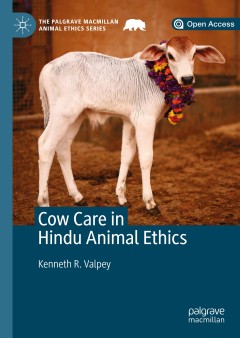
Cow care in Hindu animal ethics
This open access book provides both a broad perspective and a focused examination of cow care as a subject of widespread ethical concern in India, and increasingly in other parts of the world. In the face of what has persisted as a highly charged political issue over cow protection in India, intellectual space must be made to bring the wealth of Indian traditional ethical discourse to bear on t…
- Edition
- -
- ISBN/ISSN
- 9783030284084
- Collation
- xxx, 269p. : ill.
- Series Title
- -
- Call Number
- 179.3 VAL c

Archaeological perspectives on warfare on the Great Plains
The Great Plains of the United States have played an influential role in shaping academic and popular visions of Native American warfare, largely because of the well-documented violence that was so central to the expansion of Euroamerican settlement there. However, violence has deep roots on the Plains, and these roots have never been examined systematically across the region as a whole. Coveri…
- Edition
- -
- ISBN/ISSN
- 9781607326700
- Collation
- VII, 439 p.
- Series Title
- -
- Call Number
- 970.00497 CLA a

Science and technology governance and ethics : a global perspective from Euro…
This book analyzes the possibilities for effective global governance of science in Europe, India and China. Authors from the three regions join forces to explore how ethical concerns over new technologies can be incorporated into global science and technology policies. The first chapter introduces the topic, offering a global perspective on embedding ethics in science and technology policy. Cha…
- Edition
- -
- ISBN/ISSN
- 9783319146935
- Collation
- viii, 173p. : ill.
- Series Title
- -
- Call Number
- 509 MIL s
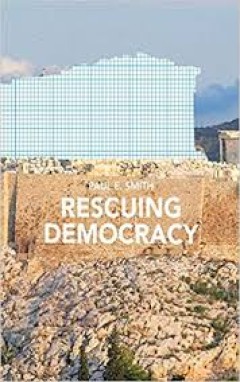
Rescuing democracy
This book proposes a new institution — the ‘People’s Forum’ — to enable democratic governments to effectively address long-running issues like global warming and inequality. It would help citizens decide what strategic problems their government must fix, especially where this requires them to suffer some inconvenience or cost. The People’s Forum is first based on a new diagnosis of …
- Edition
- -
- ISBN/ISSN
- 9780998237503
- Collation
- 192 p. ; 24 cm.
- Series Title
- -
- Call Number
- JC423 SMI r
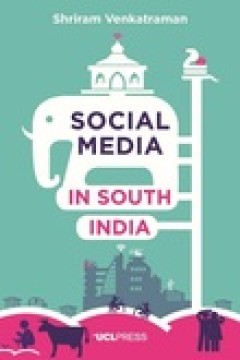
Social media in South India
One of the first ethnographic studies to explore use of social media in the everyday lives of people in Tamil Nadu, Social Media in South India provides an understanding of this subject in a region experiencing rapid transformation. The influx of IT companies over the past decade into what was once a space dominated by agriculture has resulted in a complex juxtaposition between an evolving know…
- Edition
- -
- ISBN/ISSN
- 9781911307969
- Collation
- 256 p.; 22 cm.
- Series Title
- Why We Post
- Call Number
- 302.2310954 VEN s
 Computer Science, Information & General Works
Computer Science, Information & General Works  Philosophy & Psychology
Philosophy & Psychology  Religion
Religion  Social Sciences
Social Sciences  Language
Language  Pure Science
Pure Science  Applied Sciences
Applied Sciences  Art & Recreation
Art & Recreation  Literature
Literature  History & Geography
History & Geography